30天走向成功
30天变成百万富翁的十种秘诀
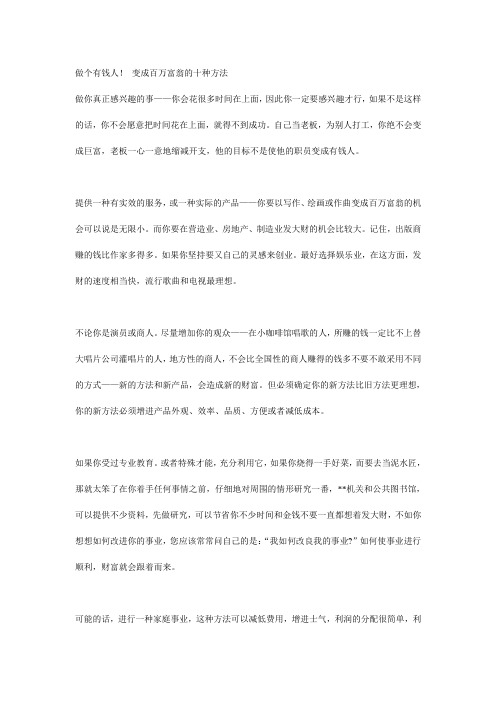
做个有钱人!变成百万富翁的十种方法做你真正感兴趣的事——你会花很多时间在上面,因此你一定要感兴趣才行,如果不是这样的话,你不会愿意把时间花在上面,就得不到成功。
自己当老板,为别人打工,你绝不会变成巨富,老板一心一意地缩减开支,他的目标不是使他的职员变成有钱人。
提供一种有实效的服务,或一种实际的产品——你要以写作、绘画或作曲变成百万富翁的机会可以说是无限小。
而你要在营造业、房地产、制造业发大财的机会比较大。
记住,出版商赚的钱比作家多得多。
如果你坚持要又自己的灵感来创业。
最好选择娱乐业,在这方面,发财的速度相当快,流行歌曲和电视最理想。
不论你是演员或商人。
尽量增加你的观众——在小咖啡馆唱歌的人,所赚的钱一定比不上替大唱片公司灌唱片的人,地方性的商人,不会比全国性的商人赚得的钱多不要不敢采用不同的方式——新的方法和新产品,会造成新的财富。
但必须确定你的新方法比旧方法更理想,你的新方法必须增进产品外观、效率、品质、方便或者减低成本。
如果你受过专业教育。
或者特殊才能,充分利用它,如果你烧得一手好菜,而要去当泥水匠,那就太笨了在你着手任何事情之前,仔细地对周围的情形研究一番,**机关和公共图书馆,可以提供不少资料,先做研究,可以节省你不少时间和金钱不要一直都想着发大财,不如你想想如何改进你的事业,您应该常常问自己的是:“我如何改良我的事业?”如何使事业进行顺利,财富就会跟着而来。
可能的话,进行一种家庭事业,这种方法可以减低费用,增进士气,利润的分配很简单,利润能够得到充分的利用,整个事业控制也较容易尽可能减低你的费用,但不能牺牲你的品质,否则的话,你等于是在慢性自杀,赚钱的机会不会大。
跟同行的分维持友谊——他们可能对你很有帮助。
尽量把时间花在你的事业上,一天十二小时,一星期六天。
是最低的要求,一天十四小时到十八小时是很平常,一星期工作七天最好了。
你必须先生家庭和社会上的娱乐,直到你事业站稳为止,也只有到那时候,你才能把责任分给别人。
演讲与口才训练30天速成
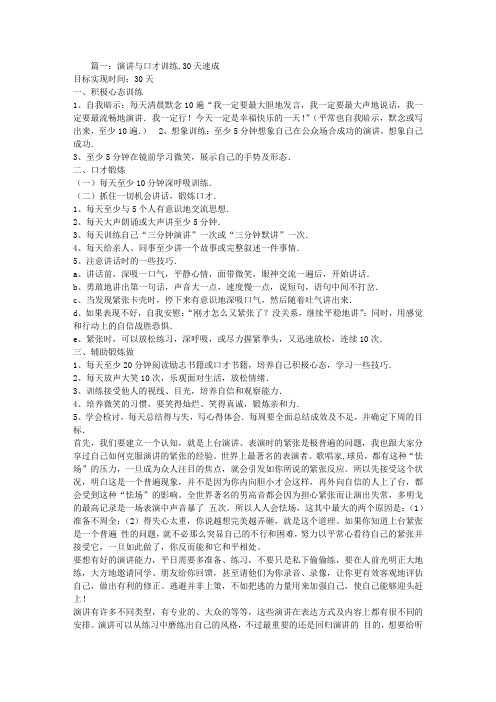
篇一:演讲与口才训练,30天速成目标实现时间:30天一、积极心态训练1、自我暗示:每天清晨默念10遍“我一定要最大胆地发言,我一定要最大声地说话,我一定要最流畅地演讲.我一定行!今天一定是幸福快乐的一天!”(平常也自我暗示,默念或写出来,至少10遍.)2、想象训练:至少5分钟想象自己在公众场合成功的演讲,想象自己成功.3、至少5分钟在镜前学习微笑,展示自己的手势及形态.二、口才锻炼(一)每天至少10分钟深呼吸训练.(二)抓住一切机会讲话,锻炼口才.1、每天至少与5个人有意识地交流思想.2、每天大声朗诵或大声讲至少5分钟.3、每天训练自己“三分钟演讲”一次或“三分钟默讲”一次.4、每天给亲人、同事至少讲一个故事或完整叙述一件事情.5、注意讲话时的一些技巧.a、讲话前,深吸一口气,平静心情,面带微笑,眼神交流一遍后,开始讲话.b、勇敢地讲出第一句话,声音大一点,速度慢一点,说短句,语句中间不打岔.c、当发现紧张卡壳时,停下来有意识地深吸口气,然后随着吐气讲出来.d、如果表现不好,自我安慰:“刚才怎么又紧张了?没关系,继续平稳地讲”;同时,用感觉和行动上的自信战胜恐惧.e、紧张时,可以放松练习,深呼吸,或尽力握紧拳头,又迅速放松,连续10次.三、辅助锻炼做1、每天至少20分钟阅读励志书籍或口才书籍,培养自己积极心态,学习一些技巧.2、每天放声大笑10次,乐观面对生活,放松情绪.3、训练接受他人的视线、目光,培养自信和观察能力.4、培养微笑的习惯,要笑得灿烂、笑得真诚,锻炼亲和力.5、学会检讨,每天总结得与失,写心得体会.每周要全面总结成效及不足,并确定下周的目标.首先,我们要建立一个认知,就是上台演讲、表演时的紧张是极普遍的问题,我也跟大家分享过自己如何克服演讲的紧张的经验。
世界上最著名的表演者、歌唱家,球员,都有这种“怯场”的压力,一旦成为众人注目的焦点,就会引发如你所说的紧张反应。
所以先接受这个状况,明白这是一个普遍现象,并不是因为你内向胆小才会这样,再外向自信的人上了台,都会受到这种“怯场”的影响。
30天走向成功
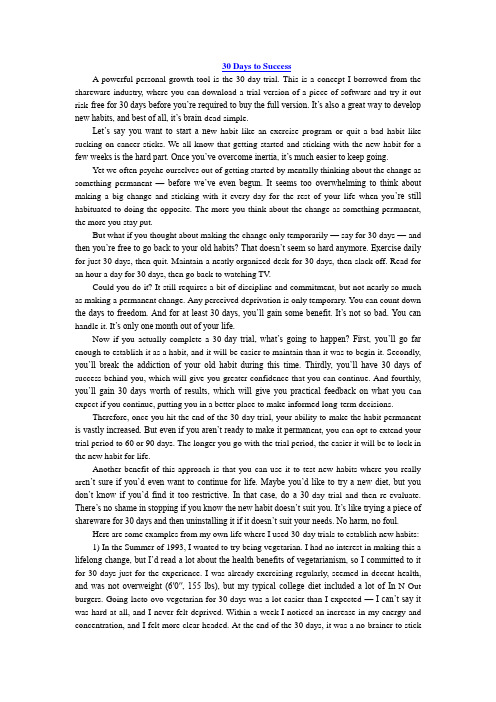
30 Days to SuccessA powerful personal growth tool is the 30-day trial. This is a concept I borrowed from the shareware industry, where you can download a trial version of a piece of software and try it out risk-free for 30 days before you’re required to buy the full version. It’s also a great way to develop new habits, and best of all, it’s brain-dead simple.Let’s say you want to start a ne w habit like an exercise program or quit a bad habit like sucking on cancer sticks. We all know that getting started and sticking with the new habit for a few weeks is the hard part. Once you’ve overcome inertia, it’s much easier to keep going.Y et we often psyche ourselves out of getting started by mentally thinking about the change as something permanent —before we’ve even begun. It seems too overwhelming to think about making a big change and sticking with it every day for the rest of your life when you’re still habituated to doing the opposite. The more you think about the change as something permanent, the more you stay put.But what if you thought about making the change only temporarily — say for 30 days — and then you’re free to go back to your old habits? That doesn’t seem so hard anymore. Exercise daily for just 30 days, then quit. Maintain a neatly organized desk for 30 days, then slack off. Read for an hour a day for 30 days, then go back to watching TV.Could you do it? It still requires a bit of discipline and commitment, but not nearly so much as making a permanent change. Any perceived deprivation is only temporary. Y ou can count down the days to freedom. And for at least 30 days, you’ll gain some benefit. It’s not so bad. Y ou can handle it. I t’s only one month out of your life.Now if you actually complete a 30-day trial, what’s going to happen? First, you’ll go far enough to establish it as a habit, and it will be easier to maintain than it was to begin it. Secondly, you’ll break the addiction of your old habit during this time. Thirdly, you’ll have 30 days of success behind you, which will give you greater confidence that you can continue. And fourthly, you’ll gain 30 days worth of results, which will give you practical feedback on what you c an expect if you continue, putting you in a better place to make informed long-term decisions.Therefore, once you hit the end of the 30-day trial, your ability to make the habit permanent is vastly increased. But even if you aren’t ready to make it perman ent, you can opt to extend your trial period to 60 or 90 days. The longer you go with the trial period, the easier it will be to lock in the new habit for life.Another benefit of this approach is that you can use it to test new habits where you really are n’t sure if you’d even want to continue for life. Maybe you’d like to try a new diet, but you don’t know if you’d find it too restrictive. In that case, do a 30-day trial and then re-evaluate. There’s no shame in stopping if you know the new habit doesn’t suit you. It’s like trying a piece of shareware for 30 days and then uninstalling it if it doesn’t suit your needs. No harm, no foul.Here are some examples from my own life where I used 30-day trials to establish new habits:1) In the Summer of 1993, I wanted to try being vegetarian. I had no interest in making this a lifelong change, but I’d read a lot about the health benefits of vegetarianism, so I committed to it for 30 days just for the experience. I was already exercising regularly, seemed in decent health, and was not overweight (6′0″, 155 lbs), but my typical college diet included a lot of In-N-Out burgers. Going lacto-ovo vegetarian for 30 days was a lot easier than I expected —I can’t say it was hard at all, and I never felt deprived. Within a week I noticed an increase in my energy and concentration, and I felt more clear-headed. At the end of the 30 days, it was a no-brainer to stickwith it. This change looked a lot harder than it really was.2) In January 1997, I decided to try going from vegetarian to vegan. While lacto-ovo vegetarians can eat eggs and dairy, vegans don’t eat anything that comes from an animal. I was developing an interest in going vegan for life, but I didn’t think I could do it. How could I give up veggie-cheese omelettes? The diet seemed too restrictive to me — even fanatically so. But I was intensely curious to know what it was actually like. So once again I did a 30-day trial. At the time I figured I’d make it through the trial, but I honestly didn’t expect to continue bey ond that. Well, I lost seven pounds in the first week, mostly from going to the bathroom as all the accumulated dairy mucus was cleansed from my bowels (now I know why cows need four stomachs to properly digest this stuff). I felt lousy the first couple days but then my energy surged. I also felt more clear-headed than ever, as if a “fog of brain” had been lifted; it felt like my brain had gotten a CPU and a RAM upgrade. However, the biggest change I noticed was in my endurance. I was living in Marina del Rey at the time and used to run along the beach near the Santa Monica Pier, and I noticed I wasn’t as tired after my usual 3-mile runs, so I started increasing them to 5 miles, 10 miles, and then eventually a marathon a few years later. In Tae Kwon Do, the extra endurance really gave a boost to my sparring skills as well. The accumulated benefits were so great that the foods I was giving up just didn’t seem so appealing anymore. So once again it was a no-brainer to continue after the first 30 days, and I’m still vegan today. What I didn’t expect was that after so long on this diet, the old animal product foods I used to eat just don’t seem like food anymore, so there’s no feeling of deprivation.3) Also in 1997, I decided I wanted to exercise every single day for a year. That was my 1997 New Y ear’s resolution. My criteria was that I would exercise aerobically at least 25 minutes every day, and I wouldn’t count Tae Kwon Do classes which I was taking 2-3 days per week. Coupled with my dietary changes, I wanted t o push my fitness to a new level. I didn’t want to miss a single day, not even for sick days. But thinking about exercising 365 days in a row was daunting, so I mentally began with a 30-day trial. That wasn’t so bad. After a while every day that passed set a new record: 8 days in a row… 10 days… 15 days…. It became harder to quit. After 30 days in a row, how could I not do 31 and set a new personal record? And can you imagine giving up after 250 days? No way. After the initial month to establish the habit, the rest of the year took care of itself. I remember going to a seminar that year and getting home well after midnight. I had a cold and was really tired, yet I still went out running at 2am in the rain. Some people might call that foolish, but I was so de termined to reach my goal that I wasn’t going to let fatigue or illness stop me. I succeeded and kept it up for the whole year without ever missing a day. In fact, I kept going for a few more weeks into 1998 before I finally opted to stop, which was a tough decision. I wanted to do this for one year, knowing it would become a powerful reference experience, and it certainly became such.4) More diet stuff…. After being vegan for a number of years, I opted to try other variations of the vegan diet. I did 30-day trials both with the macrobiotic diet and with the raw foods diet. Those were interesting and gave me new insights, but I decided not to continue with either of them.I felt no different eating macrobiotically than I did otherwise. And in the case of the raw diet, while I did notice a significant energy boost, I found the diet too labor intensive — I was spending a lot of time preparing meals and shopping frequently. Sure you can just eat raw fruits and veggies, but to make interesting raw meals, there c an be a lot of labor involved. If I had my own chef, I’d probably follow the raw diet though because I think the benefits would be worth it. I did a secondtrial of the raw diet for 45 days, but again my conclusion was the same. If I was ever diagnosed wit h a serious disease like cancer, I’d immediately switch to an all raw, living foods diet, since I believe it to be the absolute best diet for optimal health. I’ve never felt more energetic in my life than when I ate a raw diet. But I had a hard time making it practical for me. Even so, I managed to integrate some new macrobiotic foods and raw foods into my diet after these trials. There are two all-raw restaurants here in V egas, and I’ve enjoyed eating at them because then someone else does all the labor. So these 30-day trials were still successful in that they produced new insights, although in both cases I intentionally declined to continue with the new habit. One of the reasons a full 30-day trial is so important with new diets is that the first week or two will often be spent detoxing and overcoming cravings, so it isn’t until the third or fourth week that you begin to get a clear picture. I feel that if you haven’t tried a diet for at least 30 days, you simply don’t understand it. Every diet feels different on the inside than it appears from the outside.This 30-day method seems to work best for daily habits. I’ve had no luck using it when trying to start a habit that only occurs 3-4 days per week. However, it can work well if you apply it daily for the first 30 days and then cut back thereafter. This is what I’d do when starting a new exercise program, for example. Daily habits are much easier to establish.Here are some other ideas for applying 30-day trials:∙Give up TV. Tape all your favorite shows and save them until the end of the trial. My whole family did this once, and it was very enlightening.∙Give up online forums, especially if you feel you’re becoming forum addicted. This will help break the addiction and give you a clearer sense of how participation actually benefits you (if at all). Y ou can always catch up at the end of 30 days.∙Shower/bathe/shave every day. I know YOU don’t need this one, so please pass it along to someone who does.∙Meet someone new every day. Start up a conversation with a stranger.∙Go out every evening. Go somewhere different each time, and do something fun — this will be a memorable month.∙Spend 30 minutes cleaning up and organizing your home or office every day. That’s 15 hours total.∙List something new to sell on ebay every day. Purge some of that clutter.∙Ask someone new out on a date every day. Unless your success rate is below 3%, you’ll get at least one new date, maybe even meet your future spouse.∙If you’re already in a relationship, give your partner a massage every day. Or offer to alternate who gives the massage each day, so that’s 15 massages each.∙Give up cigarettes, soda, junk food, coffee, or other unhealthy addictions.∙Become an early riser.∙Write in your journal every day.∙Call a different family member, friend, or business contact every day.∙Make 25 sales calls every day to solicit new business. Professional speaker Mike Ferry did this five days a week for two years, even on days when he was giving seminars. He credits this habit with helping build his business to over $10 million in annual sales. If you make 1300 sales calls a year, you’re going to get some decent business no matter how bad your sales skills are. Y ou can generalize this habit to any kind of marketing work, like building new links to your web site.∙Write a new blog entry every day.∙Read for an hour a day on a subject that interests you.∙Meditate every day.∙Learn a new vocabulary word every day.∙Go for a long walk every day.Again, don’t think that you need to continue any of these habits beyond 30 days. Think of the benefits you’ll gain from those 30 days alone. Y ou can re-assess after the trial period. Y ou’re certain to grow just from the experience, even if it’s temporary.The power of this approach lies in its simplicity. Even though doing a certain activity every single day may be less efficient than following a more complicated schedule — weight training is a good example because adequate rest is a key component —you’ll often be more likely to stick with the daily habit. When you commit to doing something every single day without exception, you can’t rationalize or justify missing a day, nor can you promise to make it up later by reshuffling your schedule.Give trials a try. If you’re ready to commit to one right now, please feel free to post a comment and share your goal for the next 30 days. If there’s enough interest, then perhaps we can do a group postmortem around May 20th to see how it went for everyon e. I’ll even do it with you. Mine will be to go running or biking for at least 25 minutes or do a minimum 60-minute hike in the mountains every day for 30 days. The weather here in Vegas has been great lately, so it’s a nice time for me to get back to exercising outdoors.。
30天走向成功
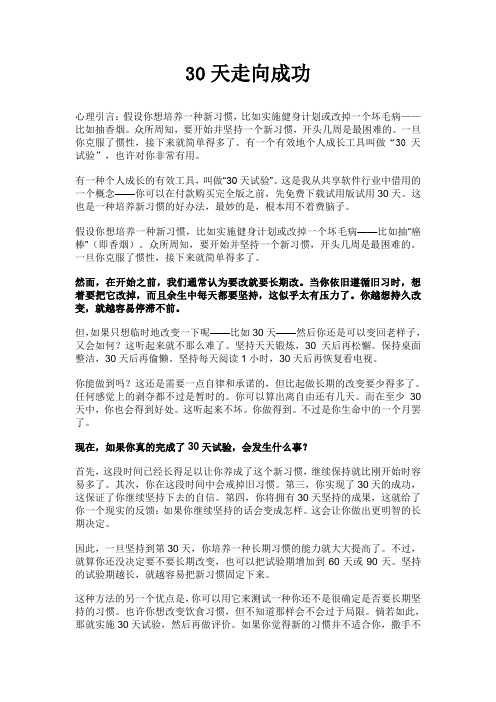
30天走向成功心理引言:假设你想培养一种新习惯,比如实施健身计划或改掉一个坏毛病——比如抽香烟。
众所周知,要开始并坚持一个新习惯,开头几周是最困难的。
一旦你克服了惯性,接下来就简单得多了。
有一个有效地个人成长工具叫做“30天试验”,也许对你非常有用。
有一种个人成长的有效工具,叫做“30天试验”。
这是我从共享软件行业中借用的一个概念——你可以在付款购买完全版之前,先免费下载试用版试用30天。
这也是一种培养新习惯的好办法,最妙的是,根本用不着费脑子。
假设你想培养一种新习惯,比如实施健身计划或改掉一个坏毛病——比如抽“癌棒”(即香烟)。
众所周知,要开始并坚持一个新习惯,开头几周是最困难的。
一旦你克服了惯性,接下来就简单得多了。
然而,在开始之前,我们通常认为要改就要长期改。
当你依旧遵循旧习时,想着要把它改掉,而且余生中每天都要坚持,这似乎太有压力了。
你越想持久改变,就越容易停滞不前。
但,如果只想临时地改变一下呢——比如30天——然后你还是可以变回老样子,又会如何?这听起来就不那么难了。
坚持天天锻炼,30天后再松懈。
保持桌面整洁,30天后再偷懒。
坚持每天阅读1小时,30天后再恢复看电视。
你能做到吗?这还是需要一点自律和承诺的,但比起做长期的改变要少得多了。
任何感觉上的剥夺都不过是暂时的。
你可以算出离自由还有几天。
而在至少30天中,你也会得到好处。
这听起来不坏。
你做得到。
不过是你生命中的一个月罢了。
现在,如果你真的完成了30天试验,会发生什么事?首先,这段时间已经长得足以让你养成了这个新习惯,继续保持就比刚开始时容易多了。
其次,你在这段时间中会戒掉旧习惯。
第三,你实现了30天的成功,这保证了你继续坚持下去的自信。
第四,你将拥有30天坚持的成果,这就给了你一个现实的反馈:如果你继续坚持的话会变成怎样。
这会让你做出更明智的长期决定。
因此,一旦坚持到第30天,你培养一种长期习惯的能力就大大提高了。
不过,就算你还没决定要不要长期改变,也可以把试验期增加到60天或90天。
中考逆袭30天学习时间计划
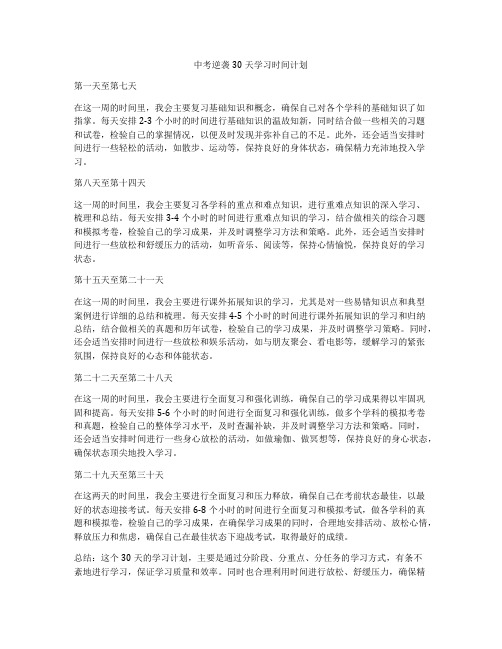
中考逆袭30天学习时间计划第一天至第七天在这一周的时间里,我会主要复习基础知识和概念,确保自己对各个学科的基础知识了如指掌。
每天安排2-3个小时的时间进行基础知识的温故知新,同时结合做一些相关的习题和试卷,检验自己的掌握情况,以便及时发现并弥补自己的不足。
此外,还会适当安排时间进行一些轻松的活动,如散步、运动等,保持良好的身体状态,确保精力充沛地投入学习。
第八天至第十四天这一周的时间里,我会主要复习各学科的重点和难点知识,进行重难点知识的深入学习、梳理和总结。
每天安排3-4个小时的时间进行重难点知识的学习,结合做相关的综合习题和模拟考卷,检验自己的学习成果,并及时调整学习方法和策略。
此外,还会适当安排时间进行一些放松和舒缓压力的活动,如听音乐、阅读等,保持心情愉悦,保持良好的学习状态。
第十五天至第二十一天在这一周的时间里,我会主要进行课外拓展知识的学习,尤其是对一些易错知识点和典型案例进行详细的总结和梳理。
每天安排4-5个小时的时间进行课外拓展知识的学习和归纳总结,结合做相关的真题和历年试卷,检验自己的学习成果,并及时调整学习策略。
同时,还会适当安排时间进行一些放松和娱乐活动,如与朋友聚会、看电影等,缓解学习的紧张氛围,保持良好的心态和体能状态。
第二十二天至第二十八天在这一周的时间里,我会主要进行全面复习和强化训练,确保自己的学习成果得以牢固巩固和提高。
每天安排5-6个小时的时间进行全面复习和强化训练,做多个学科的模拟考卷和真题,检验自己的整体学习水平,及时查漏补缺,并及时调整学习方法和策略。
同时,还会适当安排时间进行一些身心放松的活动,如做瑜伽、做冥想等,保持良好的身心状态,确保状态顶尖地投入学习。
第二十九天至第三十天在这两天的时间里,我会主要进行全面复习和压力释放,确保自己在考前状态最佳,以最好的状态迎接考试。
每天安排6-8个小时的时间进行全面复习和模拟考试,做各学科的真题和模拟卷,检验自己的学习成果,在确保学习成果的同时,合理地安排活动、放松心情,释放压力和焦虑,确保自己在最佳状态下迎战考试,取得最好的成绩。
30天,你会创造奇迹
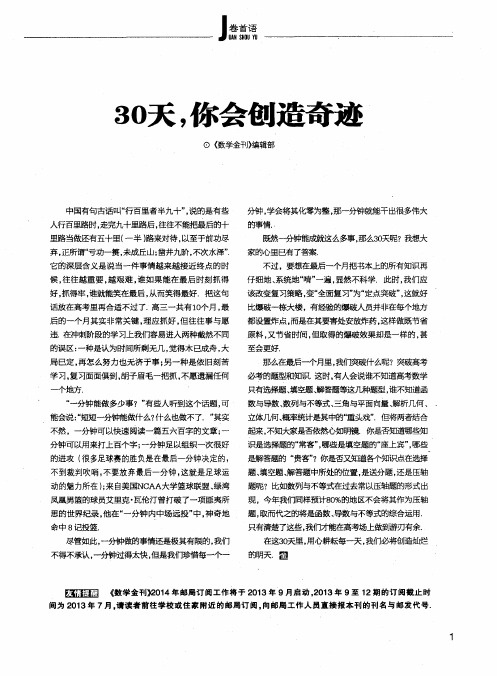
里路当做还有五十里( 一半 ) 路来对待, 以至于前功尽
弃, 正所谓“ 亏功一篑 , 未成丘山 ; 凿井九 阶, 不次 水泽” .
它 的深层含义 是说 当一件事 情越来 越接 近终点 的时 候, 往
既然一分钟能成就这么多事 , 那么3 O 天呢? 我想大
的进攻 ( 很多足球赛的胜负是在最后一分钟决定的, 不到裁判吹哨, 不要放弃最后一分钟 , 这就是足球运 动的魅力所在 ) ; 来自美国N C AA 大学篮球联盟、 绿湾
凤凰男篮的球员艾里克 ・ 瓦伦汀 曾打破了一项 匪夷所
思的 世界纪录 。 他在 “ 一 分钟 内中场远 投” 中, 神奇 地
只有选择题 、 填空题 、 解答题等这几种题型 , 谁不知道函 数 与导数 、 数列与不等式、 三角与平面向量 、 解析几何 、 . 立体几何、 概率统计是其 中的“ 重头戏 ” .但将两者结合
个 地方 .
“
一
分钟能做多少 事?” 有 些人听到这个话题 , 可
能会说 : “ 短短一分钟能做什么? 什么也做 不了.” 其实
尽管如此 , 一分钟做的事情还是极其 有限的 , 我们 不得不承认 。 一分钟过得太 决, 但是我们珍惜每一个一
盈
《 数学金刊》 2 0 1 4年邮局订阅工作将于 2 0 1 3年 9月启动 , 2 0 1 3年 9至 1 2 期的订 阅截止时
间为 2 0 1 3年 7月 。 请 读者 前往 学校或 住 家 附近 的 邮局订 阅 , 向 邮局 工作 人员 直接 报本 刊 的刊 名与 邮发 代 号.
命中 8记投篮.
题、 填空题、 解答题中所处的位置, 是送分题, 还是压轴
题呢?比如数列 与不等式在过去常 以压轴题的形式出
高三逆袭30天学习计划
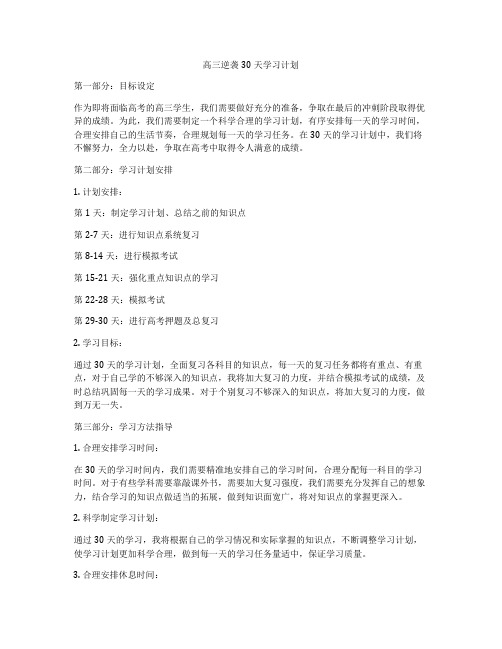
高三逆袭30天学习计划第一部分:目标设定作为即将面临高考的高三学生,我们需要做好充分的准备,争取在最后的冲刺阶段取得优异的成绩。
为此,我们需要制定一个科学合理的学习计划,有序安排每一天的学习时间,合理安排自己的生活节奏,合理规划每一天的学习任务。
在30天的学习计划中,我们将不懈努力,全力以赴,争取在高考中取得令人满意的成绩。
第二部分:学习计划安排1. 计划安排:第1天:制定学习计划、总结之前的知识点第2-7天:进行知识点系统复习第8-14天:进行模拟考试第15-21天:强化重点知识点的学习第22-28天:模拟考试第29-30天:进行高考押题及总复习2. 学习目标:通过30天的学习计划,全面复习各科目的知识点,每一天的复习任务都将有重点、有重点,对于自己学的不够深入的知识点,我将加大复习的力度,并结合模拟考试的成绩,及时总结巩固每一天的学习成果。
对于个别复习不够深入的知识点,将加大复习的力度,做到万无一失。
第三部分:学习方法指导1. 合理安排学习时间:在30天的学习时间内,我们需要精准地安排自己的学习时间,合理分配每一科目的学习时间。
对于有些学科需要靠敲课外书,需要加大复习强度,我们需要充分发挥自己的想象力,结合学习的知识点做适当的拓展,做到知识面宽广,将对知识点的掌握更深入。
2. 科学制定学习计划:通过30天的学习,我将根据自己的学习情况和实际掌握的知识点,不断调整学习计划,使学习计划更加科学合理,做到每一天的学习任务量适中,保证学习质量。
3. 合理安排休息时间:学习并非只有枯燥无味,对于自己的学习充满自信,提升自己的学习积极性。
我们需要安排适当的休息时间,让自己在学习之余,得到更多的放松和娱乐,保持绝对的学习积极心态。
第四部分:模拟考试在30天的学习计划中,模拟考试将是一个重要内容。
通过模拟考试,我们可以充分了解自己的学习水平,及时总结巩固知识点,发现问题,找到问题解决方案,使我们在逆袭的过程中更加从容自如。
冲刺高考用30天创造奇迹

冲刺高考用30天创造奇迹-CAL-FENGHAI-(2020YEAR-YICAI)_JINGBIAN冲刺高考用30天创造奇迹高中三年,我们怀着成功的理想,一路艰辛跋涉、攀登,到今天,离成功的顶峰还有最后一个月。
今天,在我们登上顶峰之前,动起来,再作一次深呼吸,憋足胜利前的最后一口勇气,以更快的速度,以更强的劲头,以不到长城非好汉的必胜信念,向胜利的巅峰作最后的冲刺。
现在离2015年高考仅有一个月,高考的脚步越来越近了,我们的心里既是期待又有恐惧,既有兴奋紧张,又有焦虑不安,可是同学们,号角已经吹响,冲锋已经发起,我们没有办法停住自己的脚步,我们也不能停止自己的脚步,我们只有勇往直前,奋不顾身的冲向前去,才是我们应该做的,也是我们必须做的。
同学们,在这最后冲锋的过程中,请你们记住一句话:“坚持到底、永不放弃,不到高考最后结束,一切皆有可能”!多一份坚持就多了一份勇气,多一份坚持就多了一份希望,当你在痛苦中徘徊、犹疑时,请相信,你的对手也在接受同样的挑战,谁能坚持到底,谁便是最后的胜者,谁不放弃希望,谁就能笑到最后。
30天可以创造奇迹。
坚持到底,永不放弃,就是不论你前面考试成绩有多好,你都不要满足,你都不要骄傲,你都不要有丝毫松劲。
冲刺高考,如逆水行船,不进则退,过去每年都曾有,平时成绩的骄骄者,因为最后冲刺阶段的自满和松劲,到高考时败走麦城的沉痛教训。
坚持到底,永不放弃,就是不论你前面考试成绩有多不如意,你都不要灰心,都不要泄气,要相信在最后一个月冲刺的过程中,在高考的战场上,会发生一些令你意想不到的奇迹。
坚持到底、永不放弃,就是要在最后冲刺的阶段,保持最佳的心理状态和身体状态,以饱满的精神从容面对即将来临的高考。
高考既是考知识、考能力,也是考心态,考身体。
越到后面,越是考心态。
有一个教授说:高考考场上,是四分考知识,六分考心理。
不要为过去的的某次考试患得患失,要往前看,每次考试就是检查自己的复习程度,有好也有不好的,把好的继续做得更好,把不好给与改正。
坚持30天:改变惊人
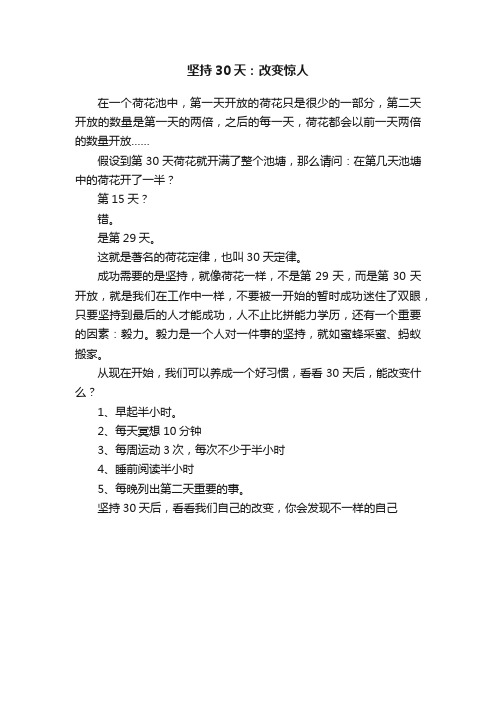
坚持30天:改变惊人
在一个荷花池中,第一天开放的荷花只是很少的一部分,第二天开放的数量是第一天的两倍,之后的每一天,荷花都会以前一天两倍的数量开放……
假设到第30天荷花就开满了整个池塘,那么请问:在第几天池塘中的荷花开了一半?
第15天?
错。
是第29天。
这就是著名的荷花定律,也叫30天定律。
成功需要的是坚持,就像荷花一样,不是第29天,而是第30天开放,就是我们在工作中一样,不要被一开始的暂时成功迷住了双眼,只要坚持到最后的人才能成功,人不止比拼能力学历,还有一个重要的因素:毅力。
毅力是一个人对一件事的坚持,就如蜜蜂采蜜、蚂蚁搬家。
从现在开始,我们可以养成一个好习惯,看看30天后,能改变什么?
1、早起半小时。
2、每天冥想10分钟
3、每周运动3次,每次不少于半小时
4、睡前阅读半小时
5、每晚列出第二天重要的事。
坚持30天后,看看我们自己的改变,你会发现不一样的自己。
寒假30天学习逆袭计划

寒假30天学习逆袭计划第一天:寒假的第一天,我按照计划开始了我的学习逆袭计划。
首先,我制定了一个详细的学习计划,包括每天的学习时间安排、学习内容和计划目标。
我决定每天早上7点起床,之后进行一小时的晨间运动,让我的身体和大脑都在最佳状态。
接着,我将每天的学习时间分为四个部分,分别是上午、下午、晚上和夜间。
每个部分的学习内容都有具体的安排,例如复习课本知识、做练习题、阅读扩展书籍等。
第二天:第二天,我按照计划进行了学习。
我首先复习了上学期学习的数学知识,重新温习了代数、方程式等内容。
然后,我花了一些时间做了一些数学的练习题,巩固了所学的知识。
下午的学习时间,我选择了英语作为主要学习内容。
我复习了一些语法知识,然后阅读了一篇英语文章。
晚上,我开始了化学的学习,并且做了一些化学实验。
第三天:第三天,我继续按照计划学习。
我开始了语文的学习,复习了一些古诗文和现代文学作品。
下午,我进行了历史学科的学习,复习了一些历史事件和人物。
晚上,我选择了物理学科,复习了一些力学知识,并进行了一些物理实验。
第四天:第四天,我开始了化学和生物学科的学习。
我复习了一些化学的知识,还进行了一些化学反应实验。
下午,我学习了生物的知识,复习了一些生物分类和细胞结构等内容。
第五天:第五天,我继续进行了化学和生物的学习。
我进行了一些生物实验,观察了一些生物现象。
晚上,我进行了基础数学和物理的学习,复习了一些数学和物理的公式和定理。
第六天:第六天,我进行了综合的复习,对之前学习的各科知识进行了总结和梳理。
我认识到自己还有许多知识需要进一步学习和理解,所以,我开始了针对性的专项学习。
第七至十五天:接下来的一个星期里,我将针对性地学习每个学科的知识,重点复习和强化自己的薄弱科目,并在假期偏科补习班进行系统的学习。
第十六至二十天:我将进行全科目的模拟考试,从而了解自己的学习成绩和学习成果,也可以进一步规划学习的重点和方向。
第二十一至二十九天:在接下来的九天中,我将继续对学习中出现的问题进行针对性的解决,并且继续进行模拟考试,不断提升自己的学习能力和成绩。
30天改变你的人生

30天改变你的人生30天改变你的人生人生是一场漫长而又充满挑战的旅程,每个人都希望能够过上理想的生活,实现自己的梦想。
然而,要实现这样的目标并不容易,需要我们不断努力和改变自己。
在接下来的30天里,我将分享一些建议,帮助你改变人生,走向成功和幸福。
第一天:设定目标设定明确、具体和可量化的目标是成功的第一步。
请花些时间思考你想要实现的目标,并把它们写下来。
这样,你就能够有一个清晰的方向,帮助你更好地管理和分配时间和资源。
第二天:制定计划设定目标只是开始,制定具体的计划才能帮助你实现目标。
花些时间研究不同的计划和策略,找到适合自己的方式,并制定出具体的行动计划。
同时,也要预留一些时间用于评估和调整计划,以确保你在正确的轨道上。
第三天:养成良好的习惯良好的习惯是成功的基石之一。
花些时间研究自己已有的习惯,并分析哪些是对你有益的,哪些是阻碍你进步的。
从今天开始,意识到你的不良习惯并努力养成新的、积极的习惯。
坚持下去,它们会成为你成功的保障。
第四天:学习新技能在现代社会中,学习新技能是成功的关键之一。
选择你感兴趣的领域或行业,并学习相关的技能。
这将大大增加你的市场竞争力,并提升个人价值。
寻找学习资源,例如在线课程和培训机构,并利用这些资源提升自己。
第五天:建立人际关系网络人脉关系对于成功来说非常重要。
花些时间参加社交活动,结识新的朋友和业内人士。
建立良好的人际关系网络,与他人分享你的目标和计划,并寻找合作和支持的机会。
人际关系不仅能够为你带来机会和资源,还能为你提供心理和情感支持。
第六天:保持积极态度积极的态度是成功的基础。
努力培养积极的心态,并学会看到问题中的机会。
与乐观的人为伍,寻找激励和启发的资源,例如书籍、博客和演讲。
保持积极态度将让你更坚定地向前迈进,并克服遇到的挑战。
第七天:摆脱恐惧和拖延恐惧和拖延是成功的两大敌人。
努力面对恐惧并克服它们。
同时,避免拖延行为,学会及时行动。
坚持完成每天的任务,并养成良好的工作习惯。
30天走向成功
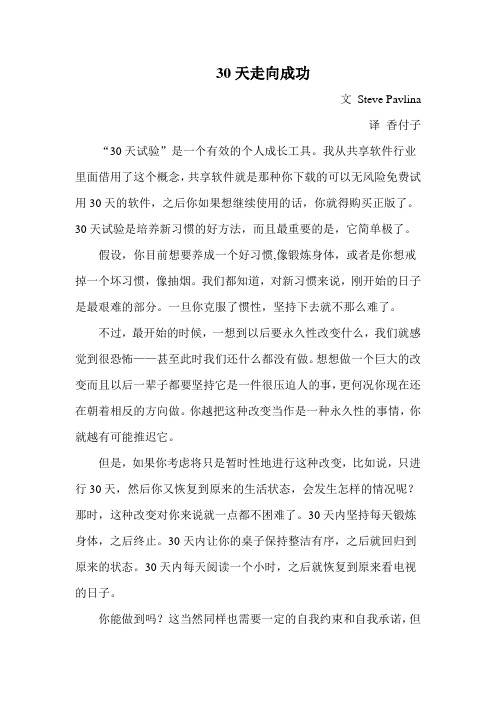
30天走向成功文Steve Pavlina译香付子“30天试验”是一个有效的个人成长工具。
我从共享软件行业里面借用了这个概念,共享软件就是那种你下载的可以无风险免费试用30天的软件,之后你如果想继续使用的话,你就得购买正版了。
30天试验是培养新习惯的好方法,而且最重要的是,它简单极了。
假设,你目前想要养成一个好习惯,像锻炼身体,或者是你想戒掉一个坏习惯,像抽烟。
我们都知道,对新习惯来说,刚开始的日子是最艰难的部分。
一旦你克服了惯性,坚持下去就不那么难了。
不过,最开始的时候,一想到以后要永久性改变什么,我们就感觉到很恐怖——甚至此时我们还什么都没有做。
想想做一个巨大的改变而且以后一辈子都要坚持它是一件很压迫人的事,更何况你现在还在朝着相反的方向做。
你越把这种改变当作是一种永久性的事情,你就越有可能推迟它。
但是,如果你考虑将只是暂时性地进行这种改变,比如说,只进行30天,然后你又恢复到原来的生活状态,会发生怎样的情况呢?那时,这种改变对你来说就一点都不困难了。
30天内坚持每天锻炼身体,之后终止。
30天内让你的桌子保持整洁有序,之后就回归到原来的状态。
30天内每天阅读一个小时,之后就恢复到原来看电视的日子。
你能做到吗?这当然同样也需要一定的自我约束和自我承诺,但是远远不及做永久性改变那么强。
任何你能意识到的被约束感都只是暂时的。
你可以计算着离自由还有几天。
而且,对于30天以上的坚持,你一定能够尝到一点甜头。
这没那么难,你可以掌控它,仅仅是你生命长河中的一个月而已。
现在,假如你真正完成了这个30天的计划,那会出现什么呢?第一,你足以将这个改变培养成为了一个习惯,这比你什么都不做的时候容易多了。
第二,在这段时间里,你已经打断了你旧习惯的惯性了。
第三,这30天成功的经验给了你自信。
第四,这30天的坚持能够让你尝到一点点甜头,由此你也能预计到如果你坚持下来有什么收获,这也将促使你进行一个长期的承诺。
因此,你一旦完成了这个30天试验,你能够坚持这个习惯的能力将会极大增长。
30天,创造我们的奇迹----踢好临门一脚!

30天,创造我们的奇迹----踢好临门一脚!一.请继续不懈努力学习至高考彻底结束!切不可让十年之功废于一月!在高考前甚至在高考前一天都要跟以前一样学习和生活。
二.每天要调整出最好的心态——适度兴奋。
过于平静不好,少了那份冲劲,狭路相逢勇者胜。
过于紧张不好,容易焦虑和抑郁。
适度兴奋是每天定好学习计划,使每天都有一种渴盼和期望,情绪饱满而有弹性。
考前暴露的问题越多,你的胜算就越大。
所以,每天应该兴奋在对问题的发现中,陶醉在对问题的解决中。
如何有一个最好的心态?每天一个小计划,一个小总结,一个小励志,一次小锻炼(跑步)!每天要做到:心态平和、目标明确、重点突出,便是最有效的学习。
每天学习之前来一个自我提醒:我要学习了,哪怕就学半个小时,一定要做到全心投入,四大皆空,心无旁骛。
三.科学备考——回归教材和刷题。
1回归教材决对不是看课本,是回归基础,即双基——基础知识和基本技能。
基础知识方面不建议面面俱到,把高频考点过一遍,掌握好的巩固,掌握不好的重点突破;基本技能建议把下学期大考中做错的题和高考经典题再做一遍,完善自己做题的方法和思路,以及做题的规范性。
2刷题三种类型——模拟考试,套题训练和个性化训练。
模拟考试:16-17日(金太阳考试);5月30日-6月1日(天一考试)。
套卷训练:周三一天考完,共两次。
各学科套题训练由学科组自行安排。
个性化训练:就是自己针对学科内易错点、能快速提高分数的模块和高频考点集中精力进行限时限量训练,打歼灭战! 个人把握具体时间,计划好执行好方成为真正的大赢家!具体刨析如下:首先关注高考必考,看似会做,经常出错的题。
在这种题上进行集中打击,集中优势兵力,你每一个学科都有这样的问题。
所以,你得学会学习后的反思。
你想想,我如果数学现在是120分,我要高考得130分,这30天完全来得及的,那么你要提高这10分,这10分在哪儿呢?就在高考必考,看似会做,经常出错的地方。
你只要突破一个点,这10分就上来了。
差生30天逆袭学霸计划(精选17篇)

差生30天逆袭学霸计划差生30天逆袭学霸计划(精选17篇)时光在流逝,从不停歇,我们的工作又迈入新的阶段,此时此刻需要制定一个详细的计划了。
计划怎么写才不会流于形式呢?下面是小编帮大家整理的差生30天逆袭学霸计划,供大家参考借鉴,希望可以帮助到有需要的朋友。
差生30天逆袭学霸计划篇1差生在学习上总的特点是智力一般,学习依赖思想严重,没有独立思考勇于创新的意识,遇到较难的题便等老师的答案,针对这一实际情况,我首先要想方设法调动学生的学习积极性,更重要的是做好差生的转化工作。
在工作中,我十分重视对学生一视同仁,不溺爱优秀生,不鄙视后进生。
制订出转化计划如下:一、利用家长会,汇报该生在校的学习情况,让家长协助教师教育和督促自己的孩子努力学习。
多听英语录音带。
二、课后多和差生交谈,态度要和蔼,使后进生愿意接近老师,经常和老师说说心里话,有利于老师对学生的了解,有利于做好后进生的转化工作。
三,开展互帮互学的活动,座位的排列尽量让中、差生创设一个好的学习环境,充分发挥课后“小老师”的作用。
四、对差生的缺点批评要恰当得体,切忌不可伤害,不能让其他同学嘲笑他们,嫌弃他们。
五、分从次设计目标,给差生制订能够完成的目标,使其能真正感到成功的喜悦。
六、利用课余时间帮助差生辅导,尽力使他们的成绩有所提高,让他们认识到“我能行”。
总之,我不但要在学习上关心后进生,还要在生活上关心每一个后进生的成长,使每个后进生真正感到班集体的温暖,激发他们的求知欲,使每位同学在德、智、体、美等方面均能得到全面发展。
差生30天逆袭学霸计划篇2时间的沙漏在我们的指尖一点点流逝,不觉之间,就升到了六年级,再也不是那吵着要吃棒棒糖的小朋友了。
身为六年级的学生,我们当然也应该有一个新的规划,新的开始。
1、每天坚持听15分钟英语,背上上节课所学过的星号单词,熟读课文、单词等;2、每天回家后在写完作业的情况下作相对的数学练习,并加以巩固今天所学的知识;3、每天至少做1面口算,至少描一面字帖;4、每天有感情地大声朗读课文一篇,并保证不加字,不减字,不读错字。
30天行动成功_训练手册31页

I
30天行动成功_训练手册
目录
致读者的一封信 (4)
第一训练单元 (5)
一、心态替代的练习 (5)
二、誓言激励的练习 (6)
三、建立自信的练习(不定期练习) (7)
四、角色假定训练 (8)
五、目标视觉化训练 (8)
第二训练单元 (9)
第三训练单元 (12)
一、目标检核 (13)
二.人生蓝图一览表 (15)
II
三.年度目标计划表 (15)
四.目标设定表 (16)
五.目前的我 (17)
六.一个月后的我 (18)
八.月目标计划表 (18)
月目标计划表 (20)
III
签名:
智慧语丝:“别人怎么做,我就怎么做。
”这是一种惰性。
跟着别人的脚印走,永远踏不出自己的人生足迹。
九、周目标计划表
改变自己的心态,就能改变自己的世界
十一.人脉网络表
姓名:生日:
手机:电话:
传真:
E-mail:
QQ/MSN:
单位/地址/住址:
姓名:生日:
手机:电话:
传真:
E-mail:
QQ/MSN:
单位/地址/住址:
姓名:生日:
手机:电话:
传真:
E-mail:
QQ/MSN:
单位/地址/住址:
姓名:生日:
手机:电话:
传真:
E-mail:
QQ/MSN:
单位/地址/住址:
姓名:生日:
手机:电话:
传真:
E-mail:
QQ/MSN:
单位/地址/住址:。
初中30天逆袭学习计划
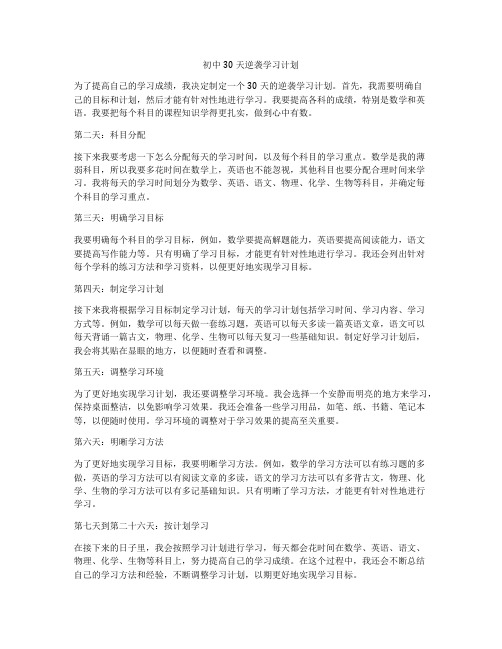
初中30天逆袭学习计划为了提高自己的学习成绩,我决定制定一个30天的逆袭学习计划。
首先,我需要明确自己的目标和计划,然后才能有针对性地进行学习。
我要提高各科的成绩,特别是数学和英语。
我要把每个科目的课程知识学得更扎实,做到心中有数。
第二天:科目分配接下来我要考虑一下怎么分配每天的学习时间,以及每个科目的学习重点。
数学是我的薄弱科目,所以我要多花时间在数学上,英语也不能忽视,其他科目也要分配合理时间来学习。
我将每天的学习时间划分为数学、英语、语文、物理、化学、生物等科目,并确定每个科目的学习重点。
第三天:明确学习目标我要明确每个科目的学习目标,例如,数学要提高解题能力,英语要提高阅读能力,语文要提高写作能力等。
只有明确了学习目标,才能更有针对性地进行学习。
我还会列出针对每个学科的练习方法和学习资料,以便更好地实现学习目标。
第四天:制定学习计划接下来我将根据学习目标制定学习计划,每天的学习计划包括学习时间、学习内容、学习方式等。
例如,数学可以每天做一套练习题,英语可以每天多读一篇英语文章,语文可以每天背诵一篇古文,物理、化学、生物可以每天复习一些基础知识。
制定好学习计划后,我会将其贴在显眼的地方,以便随时查看和调整。
第五天:调整学习环境为了更好地实现学习计划,我还要调整学习环境。
我会选择一个安静而明亮的地方来学习,保持桌面整洁,以免影响学习效果。
我还会准备一些学习用品,如笔、纸、书籍、笔记本等,以便随时使用。
学习环境的调整对于学习效果的提高至关重要。
第六天:明晰学习方法为了更好地实现学习目标,我要明晰学习方法。
例如,数学的学习方法可以有练习题的多做,英语的学习方法可以有阅读文章的多读,语文的学习方法可以有多背古文,物理、化学、生物的学习方法可以有多记基础知识。
只有明晰了学习方法,才能更有针对性地进行学习。
第七天到第二十六天:按计划学习在接下来的日子里,我会按照学习计划进行学习,每天都会花时间在数学、英语、语文、物理、化学、生物等科目上,努力提高自己的学习成绩。
30天超级成功日志
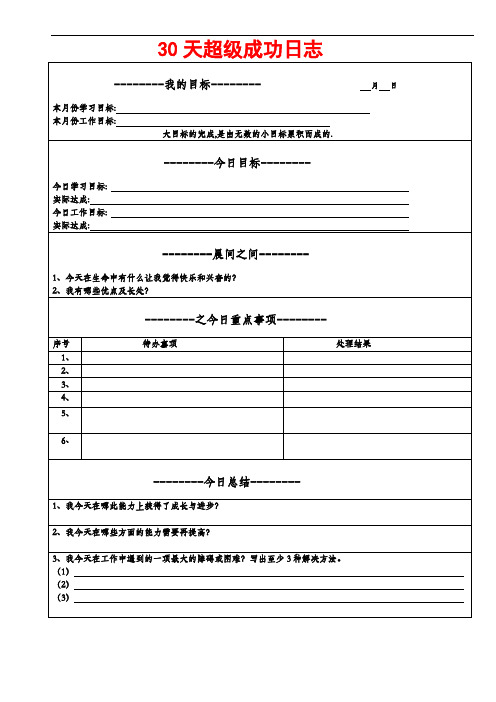
--------之今日重点事项--------
序号
待办事项
处理结果
1、
2、
3、
4、
5、
6、
--------今日总结--------
1、我今天在哪此能力上获得了成长与进步?
2、我今天在哪些方面的能力需要再提高?
3、我今天在工作中遇到的一项最大的障碍或困难?写出至少3种解决方法。
(1)
(2)
(3)
4、我今天在产品知识、工艺流程等工作中的主要具体收获?
2014年月日明日明细计划
序号
(今晚计划明天重要事情)
计划达到的结果
8:00-9:00
9:00-10:00
10:00-
11:00
11:00-11:30
11:30~13:00
14:00-15:00
15:00-16:00
16:00-17:30
19:00-20:00
20:00-21:00
21:00-22:30
备注:
1、领导工作安排:
2、突发事件处理:
3、其它事宜:
30天超级成功日志
--------我的目标--------月日
本大目标的完成,是由无数的小目标累积而成的.
--------今日目标--------
今日学习目标:
实际达成:
今日工作目标:
实际达成:
--------晨间之问--------
1、今天在生命中有什么让我觉得快乐和兴奋的?
差生高考30天奇迹
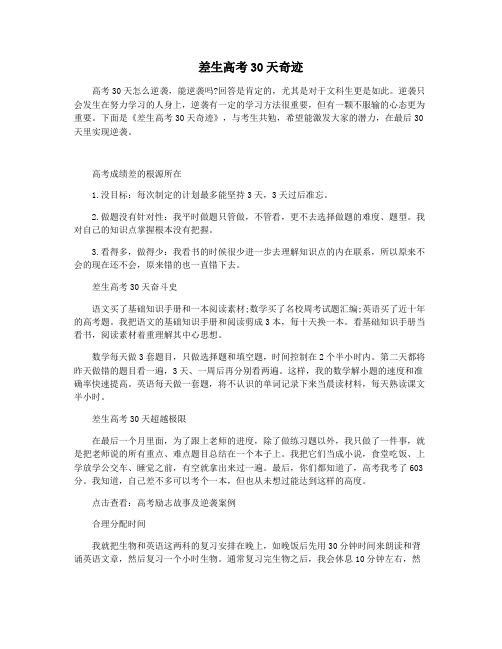
差生高考30天奇迹高考30天怎么逆袭,能逆袭吗?回答是肯定的,尤其是对于文科生更是如此。
逆袭只会发生在努力学习的人身上,逆袭有一定的学习方法很重要,但有一颗不服输的心态更为重要。
下面是《差生高考30天奇迹》,与考生共勉,希望能激发大家的潜力,在最后30天里实现逆袭。
高考成绩差的根源所在1.没目标:每次制定的计划最多能坚持3天,3天过后准忘。
2.做题没有针对性:我平时做题只管做,不管看,更不去选择做题的难度、题型。
我对自己的知识点掌握根本没有把握。
3.看得多,做得少:我看书的时候很少进一步去理解知识点的内在联系,所以原来不会的现在还不会,原来错的也一直错下去。
差生高考30天奋斗史语文买了基础知识手册和一本阅读素材;数学买了名校周考试题汇编;英语买了近十年的高考题。
我把语文的基础知识手册和阅读剪成3本,每十天换一本。
看基础知识手册当看书,阅读素材着重理解其中心思想。
数学每天做3套题目,只做选择题和填空题,时间控制在2个半小时内。
第二天都将昨天做错的题目看一遍,3天、一周后再分别看两遍。
这样,我的数学解小题的速度和准确率快速提高。
英语每天做一套题,将不认识的单词记录下来当晨读材料,每天熟读课文半小时。
差生高考30天超越极限在最后一个月里面,为了跟上老师的进度,除了做练习题以外,我只做了一件事,就是把老师说的所有重点、难点题目总结在一个本子上。
我把它们当成小说,食堂吃饭、上学放学公交车、睡觉之前,有空就拿出来过一遍。
最后,你们都知道了,高考我考了603分。
我知道,自己差不多可以考个一本,但也从未想过能达到这样的高度。
点击查看:高考励志故事及逆袭案例合理分配时间我就把生物和英语这两科的复习安排在晚上,如晚饭后先用30分钟时间来朗读和背诵英语文章,然后复习一个小时生物。
通常复习完生物之后,我会休息10分钟左右,然后开始复习英语、默写单词。
等到这两科的复习结束之后,我再做当天老师布置的理科作业。
而每天中午吃过饭之后,我会先睡半个小时,然后起来复习语文。
- 1、下载文档前请自行甄别文档内容的完整性,平台不提供额外的编辑、内容补充、找答案等附加服务。
- 2、"仅部分预览"的文档,不可在线预览部分如存在完整性等问题,可反馈申请退款(可完整预览的文档不适用该条件!)。
- 3、如文档侵犯您的权益,请联系客服反馈,我们会尽快为您处理(人工客服工作时间:9:00-18:30)。
30 Days to SuccessA powerful personal growth tool is the 30-day trial. This is a concept I borrowed from the shareware industry, where you can download a trial version of a piece of software and try it out risk-free for 30 days before you’re required to buy the full version. It’s also a great way to develop new habits, and best of all, it’s brain-dead simple.Let’s say you want to start a ne w habit like an exercise program or quit a bad habit like sucking on cancer sticks. We all know that getting started and sticking with the new habit for a few weeks is the hard part. Once you’ve overcome inertia, it’s much easier to keep going.Y et we often psyche ourselves out of getting started by mentally thinking about the change as something permanent —before we’ve even begun. It seems too overwhelming to think about making a big change and sticking with it every day for the rest of your life when you’re still habituated to doing the opposite. The more you think about the change as something permanent, the more you stay put.But what if you thought about making the change only temporarily — say for 30 days — and then you’re free to go back to your old habits? That doesn’t seem so hard anymore. Exercise daily for just 30 days, then quit. Maintain a neatly organized desk for 30 days, then slack off. Read for an hour a day for 30 days, then go back to watching TV.Could you do it? It still requires a bit of discipline and commitment, but not nearly so much as making a permanent change. Any perceived deprivation is only temporary. Y ou can count down the days to freedom. And for at least 30 days, you’ll gain some benefit. It’s not so bad. Y ou can handle it. I t’s only one month out of your life.Now if you actually complete a 30-day trial, what’s going to happen? First, you’ll go far enough to establish it as a habit, and it will be easier to maintain than it was to begin it. Secondly, you’ll break the addiction of your old habit during this time. Thirdly, you’ll have 30 days of success behind you, which will give you greater confidence that you can continue. And fourthly, you’ll gain 30 days worth of results, which will give you practical feedback on what you c an expect if you continue, putting you in a better place to make informed long-term decisions.Therefore, once you hit the end of the 30-day trial, your ability to make the habit permanent is vastly increased. But even if you aren’t ready to make it perman ent, you can opt to extend your trial period to 60 or 90 days. The longer you go with the trial period, the easier it will be to lock in the new habit for life.Another benefit of this approach is that you can use it to test new habits where you really are n’t sure if you’d even want to continue for life. Maybe you’d like to try a new diet, but you don’t know if you’d find it too restrictive. In that case, do a 30-day trial and then re-evaluate. There’s no shame in stopping if you know the new habit doesn’t suit you. It’s like trying a piece of shareware for 30 days and then uninstalling it if it doesn’t suit your needs. No harm, no foul.Here are some examples from my own life where I used 30-day trials to establish new habits:1) In the Summer of 1993, I wanted to try being vegetarian. I had no interest in making this a lifelong change, but I’d read a lot about the health benefits of vegetarianism, so I committed to it for 30 days just for the experience. I was already exercising regularly, seemed in decent health, and was not overweight (6′0″, 155 lbs), but my typical college diet included a lot of In-N-Out burgers. Going lacto-ovo vegetarian for 30 days was a lot easier than I expected —I can’t say it was hard at all, and I never felt deprived. Within a week I noticed an increase in my energy and concentration, and I felt more clear-headed. At the end of the 30 days, it was a no-brainer to stickwith it. This change looked a lot harder than it really was.2) In January 1997, I decided to try going from vegetarian to vegan. While lacto-ovo vegetarians can eat eggs and dairy, vegans don’t eat anything that comes from an animal. I was developing an interest in going vegan for life, but I didn’t think I could do it. How could I give up veggie-cheese omelettes? The diet seemed too restrictive to me — even fanatically so. But I was intensely curious to know what it was actually like. So once again I did a 30-day trial. At the time I figured I’d make it through the trial, but I honestly didn’t expect to continue bey ond that. Well, I lost seven pounds in the first week, mostly from going to the bathroom as all the accumulated dairy mucus was cleansed from my bowels (now I know why cows need four stomachs to properly digest this stuff). I felt lousy the first couple days but then my energy surged. I also felt more clear-headed than ever, as if a “fog of brain” had been lifted; it felt like my brain had gotten a CPU and a RAM upgrade. However, the biggest change I noticed was in my endurance. I was living in Marina del Rey at the time and used to run along the beach near the Santa Monica Pier, and I noticed I wasn’t as tired after my usual 3-mile runs, so I started increasing them to 5 miles, 10 miles, and then eventually a marathon a few years later. In Tae Kwon Do, the extra endurance really gave a boost to my sparring skills as well. The accumulated benefits were so great that the foods I was giving up just didn’t seem so appealing anymore. So once again it was a no-brainer to continue after the first 30 days, and I’m still vegan today. What I didn’t expect was that after so long on this diet, the old animal product foods I used to eat just don’t seem like food anymore, so there’s no feeling of deprivation.3) Also in 1997, I decided I wanted to exercise every single day for a year. That was my 1997 New Y ear’s resolution. My criteria was that I would exercise aerobically at least 25 minutes every day, and I wouldn’t count Tae Kwon Do classes which I was taking 2-3 days per week. Coupled with my dietary changes, I wanted t o push my fitness to a new level. I didn’t want to miss a single day, not even for sick days. But thinking about exercising 365 days in a row was daunting, so I mentally began with a 30-day trial. That wasn’t so bad. After a while every day that passed set a new record: 8 days in a row… 10 days… 15 days…. It became harder to quit. After 30 days in a row, how could I not do 31 and set a new personal record? And can you imagine giving up after 250 days? No way. After the initial month to establish the habit, the rest of the year took care of itself. I remember going to a seminar that year and getting home well after midnight. I had a cold and was really tired, yet I still went out running at 2am in the rain. Some people might call that foolish, but I was so de termined to reach my goal that I wasn’t going to let fatigue or illness stop me. I succeeded and kept it up for the whole year without ever missing a day. In fact, I kept going for a few more weeks into 1998 before I finally opted to stop, which was a tough decision. I wanted to do this for one year, knowing it would become a powerful reference experience, and it certainly became such.4) More diet stuff…. After being vegan for a number of years, I opted to try other variations of the vegan diet. I did 30-day trials both with the macrobiotic diet and with the raw foods diet. Those were interesting and gave me new insights, but I decided not to continue with either of them.I felt no different eating macrobiotically than I did otherwise. And in the case of the raw diet, while I did notice a significant energy boost, I found the diet too labor intensive — I was spending a lot of time preparing meals and shopping frequently. Sure you can just eat raw fruits and veggies, but to make interesting raw meals, there c an be a lot of labor involved. If I had my own chef, I’d probably follow the raw diet though because I think the benefits would be worth it. I did a secondtrial of the raw diet for 45 days, but again my conclusion was the same. If I was ever diagnosed wit h a serious disease like cancer, I’d immediately switch to an all raw, living foods diet, since I believe it to be the absolute best diet for optimal health. I’ve never felt more energetic in my life than when I ate a raw diet. But I had a hard time making it practical for me. Even so, I managed to integrate some new macrobiotic foods and raw foods into my diet after these trials. There are two all-raw restaurants here in V egas, and I’ve enjoyed eating at them because then someone else does all the labor. So these 30-day trials were still successful in that they produced new insights, although in both cases I intentionally declined to continue with the new habit. One of the reasons a full 30-day trial is so important with new diets is that the first week or two will often be spent detoxing and overcoming cravings, so it isn’t until the third or fourth week that you begin to get a clear picture. I feel that if you haven’t tried a diet for at least 30 days, you simply don’t understand it. Every diet feels different on the inside than it appears from the outside.This 30-day method seems to work best for daily habits. I’ve had no luck using it when trying to start a habit that only occurs 3-4 days per week. However, it can work well if you apply it daily for the first 30 days and then cut back thereafter. This is what I’d do when starting a new exercise program, for example. Daily habits are much easier to establish.Here are some other ideas for applying 30-day trials:∙Give up TV. Tape all your favorite shows and save them until the end of the trial. My whole family did this once, and it was very enlightening.∙Give up online forums, especially if you feel you’re becoming forum addicted. This will help break the addiction and give you a clearer sense of how participation actually benefits you (if at all). Y ou can always catch up at the end of 30 days.∙Shower/bathe/shave every day. I know YOU don’t need this one, so please pass it along to someone who does.∙Meet someone new every day. Start up a conversation with a stranger.∙Go out every evening. Go somewhere different each time, and do something fun — this will be a memorable month.∙Spend 30 minutes cleaning up and organizing your home or office every day. That’s 15 hours total.∙List something new to sell on ebay every day. Purge some of that clutter.∙Ask someone new out on a date every day. Unless your success rate is below 3%, you’ll get at least one new date, maybe even meet your future spouse.∙If you’re already in a relationship, give your partner a massage every day. Or offer to alternate who gives the massage each day, so that’s 15 massages each.∙Give up cigarettes, soda, junk food, coffee, or other unhealthy addictions.∙Become an early riser.∙Write in your journal every day.∙Call a different family member, friend, or business contact every day.∙Make 25 sales calls every day to solicit new business. Professional speaker Mike Ferry did this five days a week for two years, even on days when he was giving seminars. He credits this habit with helping build his business to over $10 million in annual sales. If you make 1300 sales calls a year, you’re going to get some decent business no matter how bad your sales skills are. Y ou can generalize this habit to any kind of marketing work, like building new links to your web site.∙Write a new blog entry every day.∙Read for an hour a day on a subject that interests you.∙Meditate every day.∙Learn a new vocabulary word every day.∙Go for a long walk every day.Again, don’t think that you need to continue any of these habits beyond 30 days. Think of the benefits you’ll gain from those 30 days alone. Y ou can re-assess after the trial period. Y ou’re certain to grow just from the experience, even if it’s temporary.The power of this approach lies in its simplicity. Even though doing a certain activity every single day may be less efficient than following a more complicated schedule — weight training is a good example because adequate rest is a key component —you’ll often be more likely to stick with the daily habit. When you commit to doing something every single day without exception, you can’t rationalize or justify missing a day, nor can you promise to make it up later by reshuffling your schedule.Give trials a try. If you’re ready to commit to one right now, please feel free to post a comment and share your goal for the next 30 days. If there’s enough interest, then perhaps we can do a group postmortem around May 20th to see how it went for everyon e. I’ll even do it with you. Mine will be to go running or biking for at least 25 minutes or do a minimum 60-minute hike in the mountains every day for 30 days. The weather here in Vegas has been great lately, so it’s a nice time for me to get back to exercising outdoors.。
